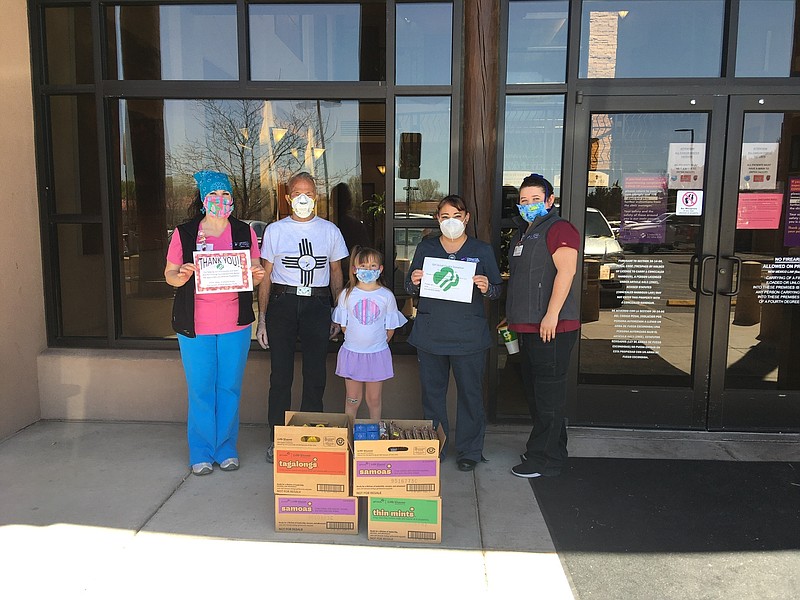The Girl Scouts have an unusual problem this year: 15 million boxes of unsold cookies.
The 109-year-old organization says the coronavirus -- not thinner demand for Thin Mints -- is the main culprit. As the pandemic wore into the spring selling season, many troops nixed their traditional cookie booths for safety reasons.
"This is unfortunate, but given this is a girl-driven program and the majority of cookies are sold in-person, it was to be expected," said Kelly Parisi, a spokeswoman for Girl Scouts of the USA.
The impact will be felt by local councils and troops, who depend on the cookie sales to fund programming, travel, camps and other activities. The Girl Scouts normally sell around 200 million boxes of cookies per year, or around $800 million worth.
Dawn Prasifka, chief executive officer of the Girl Scouts -- Diamonds, a council that covers Arkansas and parts of Oklahoma and Texas, said members usually sell about 1 million boxes of cookies over the course of two months and donate whatever they have left to food banks and other groups.
"Unfortunately because of covid, we were not able to sell as many as we had projected," Prasifka said. The Arkansas-based nonprofit had about 10,000 boxes at the end of the selling season in late spring, or roughly 10 times the amount of cookies remaining in 2020, she said.
There were fewer Girl Scouts to sell cookies this year, affecting sales as well. Prasifka said the council had 5,000 enrolled, down from as many as 8,000.
Despite financial strains, the Girl Scouts -- Diamonds were able to find ways to offload the extras by donating to schools, food banks and hospitals. Corporations also bought cookies from the nonprofit to give to employees.
To limit contact with people during the pandemic, the organization encouraged girls to sell cookies online, set up drive-by booths or drop off cookies on doorsteps.
Ava Shaddock, 10, of Little Rock, exceeded her sales goals by distributing flyers with contact information for orders over the phone or online, said mom Allison Fuller.
Although conditions were less than ideal, Fuller said her daughter sold more than 1,000 boxes of cookies with help from family, friends, neighbors and co-workers, with a significant portion coming from online sales.
"We had not much luck with it two years ago and only sold 4 boxes," she said about the online sales platform. "But with covid it was really a game changer and we sold 400."
Rebecca Latham, the chief executive officer of Girl Scouts of New Mexico Trails, said her council had 22,000 boxes left over at the end of the selling season in late spring.
Latham said troops in her area sold 805,000 boxes of cookies last year; this year, they sold just under 600,000. That shortfall means the council may not be able to invest in infrastructure improvements at its camps or fill some staff positions, she said.
The council is now encouraging people to buy boxes online through its Hometown Heroes program, which distributes cookies to health care workers, firefighters and others. It also organized one-day sales with organizations such as the New Mexico United soccer team to whittle the total down further.
Parisi said Girl Scouts of the USA did forecast lower sales this year because of the pandemic. But coronavirus restrictions were constantly shifting, and the cookie orders placed by its 111 local councils with bakers last fall were still too optimistic.
By early spring, when troops usually set up booths to sell cookies in person, U.S. coronavirus cases were still near their peak. Hundreds of girls opted not to sell cookies in person. Online sales and even a delivery partnership with Grubhub failed to make up the difference.
As a result, around 15 million boxes of cookies were left over. Most -- around 12 million boxes -- remain with the two bakers, Louisville, Ky.-based Little Brownie Bakers and Brownsburg, Ind.-based ABC Bakers. Another 3 million boxes are in the hands of the Girl Scout councils. The cookies have a 12-month shelf life.
Local councils won't be held financially responsible for the 12 million boxes that remain at the two bakers. Little Brownie Bakers and ABC Bakers said they are working with the Girl Scouts to sell or donate cookies to places like food banks and the military.
It's unclear how much of a financial hit the Girl Scouts suffered because of the decline in sales since the organization won't reveal those figures. And it isn't the biggest blow the cookie program has ever faced. That likely came during World War II, when the Girl Scouts were forced to shift from selling cookies to calendars because of wartime shortages of sugar, butter and flour.
But some local leaders say this year's slower sales should have been better predicted because falling membership was threatening cookie sales even before the pandemic began. Around 1.7 million girls were enrolled in Girl Scouts in 2019, down almost 30% from 2009.
"Without girls, there is no cookie program. Unfortunately, it took a global pandemic to bring all the problems to the surface," said Agenia Clark, president and CEO of Girl Scouts of Middle Tennessee, a local council.
As of Monday, Prasifka said that nearly all of her council's unsold cookies were gone.
"We've done it before but never on this scale," Prasifka said about donating thousands of boxes. "We hope to never do it on this scale ever again."
Information for this article was contributed by Dee-Ann Durbin of The Associated Press and Nathan Owens of the Arkansas Democrat-Gazette.





